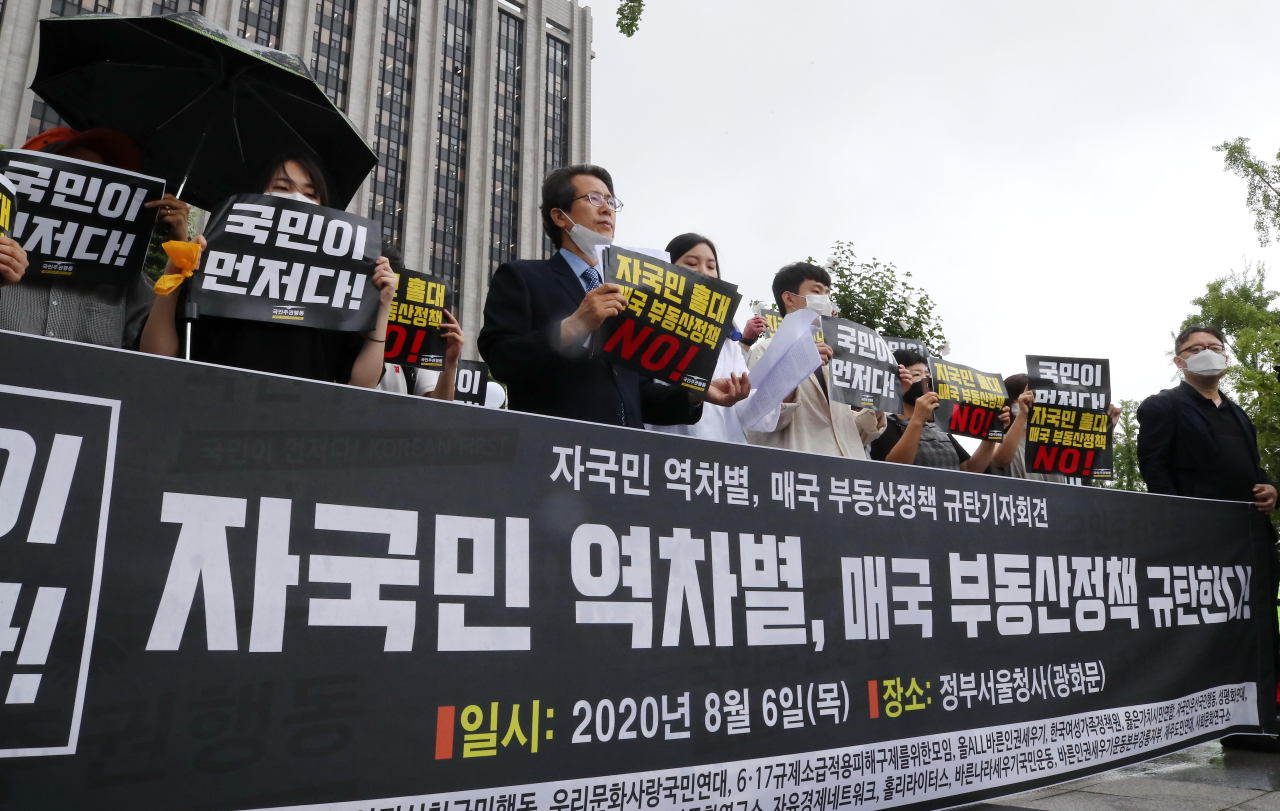 |
A nongovernmental organization protests the government`s real estate policies outside the government complex in Seoul on Aug. 6. Yonhap |
The ruling Democratic Party’s support rating has fallen behind that of the conservative opposition United Future Party for the first time in nearly three years, a survey showed Thursday.
In the survey conducted by Realmeter, the ruling party’s support rating came to 33.4 percent, down 1.7 percentage points from the previous week, while that of the United Future Party rose 1.9 percentage points to 36.5 percent.
The gap remains relatively small, but this is the first time the Democratic Party has been overtaken by a conservative party since October 2016, when the political arena became mired in the scandal that led to former President Park Geun-hye’s impeachment.
Realmeter’s figures from October 2016 show that the Saenuri Party -- the United Future Party’s predecessor -- saw its approval rating drop behind that of the Democratic Party in the fourth week of that month.
The latest Realmeter survey placed Moon’s approval rating at 43.3 percent, while 52.5 percent of the respondents negatively rated Moon’s performance. Moon’s approval rating stood at 43.9 percent and negative assessment at 52.4 percent in the previous week.
“It seems that the people are expecting something new (from the party),” Gyeonggi Province Gov. Lee Jae-myung, a potential presidential contender from the ruling party, said Thursday.
Lee also gave a hint that he understood criticism that the party moving against public sentiment.
“Politics should always respect the people’s opinion, and improve the people’s lives. I think it is a whip to make more such efforts,” Lee said, adding that he believes that issues surrounding real estate policies are the biggest factor in the drop in ratings.
The ruling party and the presidential office have been rolling out a series of policies to curb real estate speculation. However, many of the policies such as increasing tax on multiple homeowners and limiting mortgages have prompted public outrage, with critics saying that the measures hinder opportunities to buy homes and make investments for ordinary people.
Conservative heavyweights, for their part, assessed the changes in figures as being the public passing judgment on current issues.
“The people are wise and they assess what is being done well, and what is not, and that is being reflected in support ratings,” United Future Party’s interim chief Kim Chong-in said.
Kim, however, drew the line at reading into the figures, saying that survey results are only a reference of trends, and that the party will focus on doing what it can for the future.
The latest Realmeter poll showed that the biggest drop in public support for the ruling party was seen in Gangwon Province, followed by Gwangju and Jeolla Provinces. The ruling party’s support rating in Gangwon Province dropped to 30.7 percent from the previous week’s 42.3 percent. In Gwangju and Jeolla provinces, the figure dropped to 47.8 percent from 58.3 percent.
The main opposition’s advance comes as negative sentiments about President Moon Jae-in’s performance widened the lead on positive sentiments.
By age group, the Democratic Party saw the largest drop among those in their 50s, followed by 70s and older.
In this week’s survey, 34.7 percent of those in their 50s said that they supported the Democratic Party, down 7.4 percentage points from the previous week. The figures for respondents aged 70 and older went from 29.4 percent to 21.8 percent.
By Choi He-suk (
cheesuk@heraldcorp.com)








![[Today’s K-pop] Blackpink’s Jennie, Lisa invited to Coachella as solo acts](http://res.heraldm.com/phpwas/restmb_idxmake.php?idx=644&simg=/content/image/2024/11/21/20241121050099_0.jpg)